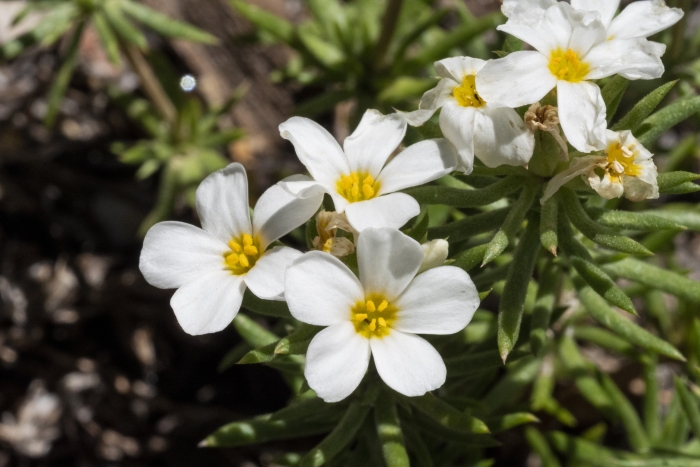Nuttall’s Linanthus
(Leptosiphon nuttallii)
Nuttall’s Linanthus (Leptosiphon nuttallii)
/
/

© Sam Eberhard
CC BY 4.0
Image By:
© Sam Eberhard
Recorded By:
Copyright:
CC BY 4.0
Copyright Notice:
Photo by: © Sam Eberhard | License Type: CC BY 4.0 | License URL: http://creativecommons.org/licenses/by/4.0/ | Uploader: bigsam | Publisher: iNaturalist |






















Estimated Native Range
Summary
Leptosiphon nuttallii, commonly known as Nuttall’s linanthus, is a perennial herb in the phlox family native to various habitats in western North America, including montane and subalpine regions, meadows, and open woodlands. Its range extends from the Klamath Mountains and Northern California Coast Ranges to the Sierra Nevada, Inyo Mountains, Peninsular Ranges, Transverse Ranges, and White Mountains. This delicate plant typically grows to a modest height of up to 8 inches tall, producing slender, hairy stems. The foliage consists of finely dissected leaves with narrow, needlelike lobes that add a fine texture to the plant’s appearance. From late spring to early summer, Nuttall’s linanthus graces the landscape with its charming flowers, which feature white corolla lobes that are joined at a yellowish throat, creating a striking contrast.
Nuttall’s linanthus is appreciated for its dainty flowers and its ability to thrive in a variety of mountainous and coastal environments. It is often used in rock gardens, native plant gardens, and as a component of wildflower meadows where its low water requirements and adaptability to different soil types are advantageous. While it prefers well-drained soils, it can tolerate a range of conditions from sandy to loamy substrates. In cultivation, it requires full sun to part shade and minimal maintenance, making it a suitable choice for gardeners seeking a low-care addition to their landscapes. However, it is not commonly found in the horticultural trade and may require propagation from seed for those interested in cultivating it.CC BY-SA 4.0
Nuttall’s linanthus is appreciated for its dainty flowers and its ability to thrive in a variety of mountainous and coastal environments. It is often used in rock gardens, native plant gardens, and as a component of wildflower meadows where its low water requirements and adaptability to different soil types are advantageous. While it prefers well-drained soils, it can tolerate a range of conditions from sandy to loamy substrates. In cultivation, it requires full sun to part shade and minimal maintenance, making it a suitable choice for gardeners seeking a low-care addition to their landscapes. However, it is not commonly found in the horticultural trade and may require propagation from seed for those interested in cultivating it.CC BY-SA 4.0
Plant Description
- Plant Type: Shrub, Herb
- Height: 0.5-1 feet
- Width: 0.5-1 feet
- Growth Rate: Moderate
- Flower Color: White, Yellow
- Flowering Season: Spring, Summer, Fall
- Leaf Retention: Semi-deciduous
Growth Requirements
- Sun: Full Sun
- Water: Low
- Drainage: Fast, Medium
Common Uses
Border Plant, Butterfly Garden, Low Maintenance, Rock Garden, Showy Flowers
Natural Habitat
Montane and subalpine regions, meadows, and open woodlands
Other Names
Common Names: Nuttall’s Leptosiphon
Scientific Names: , Leptosiphon nuttallii,
GBIF Accepted Name: